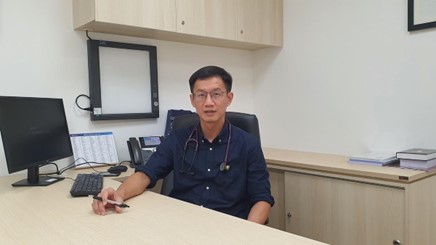
People often say that maintaining positive energy can attract many good things and make life better. Interestingly, in the field of medicine, there is a therapy called “mindfulness” that can reduce anxiety and alleviate pain for many patients and even their family members, making life less burdensome. Do you know what “mindfulness” is?
Mindfulness = Concentration + Self-awareness
Mindfulness, as the name suggests, is a state achieved by focusing on the present moment and fully activating self-awareness through the right "thoughts" and "intentions."
"Breaking down the word 'mindfulness,' it consists of 'now' and 'heart,' which also signifies 'being present in the heart.' It means immersing oneself completely in the thoughts of the present, and these thoughts must be positive, correct, and beneficial to oneself and others," explained Dr Tan Seng Beng, Consultant Palliative Medicine Physician at Subang Jaya Medical Centre.
"Mindfulness is consciously paying attention to the present moment, being aware of everything in the present, without engaging in self-critical thoughts. We should not judge, analyse, or react to anything in the present moment. We simply need to observe and notice it."
Relaxation Through "Mindful" Breathing

"I hope the public can proactively learn about mindfulness, to enhance your quality of life," Dr Tan expressed.
"As most people haven't been trained, when something negative happens, they tend to get caught in a downward spiral and don't know how to break free. When they don't know what to do, they easily get caught up in overthinking, which leads to being dragged along by negative states," Dr Tan shared.
He explained that in our daily lives, we can practice mindfulness in various ways, such as through breathing, eating, walking, and more, to relax our body and mind and release the stress from our brains. The most basic practice involves focusing on your breath, bringing yourself back from thoughts about the past or future, and learning to feel and accept the changes within yourself in the present moment.
Typically, Mindfulness-Based Stress Reduction (MBSR) and Mindfulness-Based Cognitive Therapy (MBCT) courses last for 8 weeks, but in cases where patients may not have the mental capacity or energy for that, Dr. Tan Seng Beng shortens the duration of the course. He allows them to engage in shorter-term mindfulness exercises that cover various aspects of body, mind, and spirit, known as Mini Mindfulness Exercises (MME).
"Sometimes, during consultations, I guide patients through mindfulness breathing exercises. Each session doesn't require a long time, even just 5 to 10 minutes, but the key is consistent practice."
(Many people confuse "mindfulness" with "meditation." Meditation is more about emptying oneself, while mindfulness involves focusing on current thoughts without rejecting them and being aware without judgment, requiring deliberate practice.)
He also shares his personal experience: "The nature of my work exposes me to death cases every day, and I have to deal with strong negative emotions from patients and their families. But when I practice mindfulness, I find that if I need to handle unexpected negative news during consultations, I can immediately adjust my breath and use mindfulness breathing techniques to avoid being easily affected."
Thus, he also teaches mindfulness breathing techniques to the healthcare professionals around him. This helps those who become emotionally invested in patients to adjust their emotions through mindful breathing, relax their body and mind, and alleviate the pressure and pain they feel when patients pass away.
Understanding Mindfulness For a Happier Life
While mindfulness is gradually being adopted and utilised in the medical field, there's still limited public awareness and understanding of it. Dr Tan states that although some individuals have learned about mindfulness due to personal experiences or through the advice of healthcare professionals, many people in Malaysia are still unaware of what mindfulness is and its therapeutic applications. Some even mistake mindfulness for being related to religion, leading to misconceptions and resistance.
"I hope the public can proactively learn about mindfulness, gain a deeper understanding, and not delay seeking the right treatment due to misconceptions. The earlier you learn about mindfulness and start practicing it, the sooner you can enhance your quality of life and learn how to alleviate suffering when you're unwell."
Source: Sin Chew Daily
